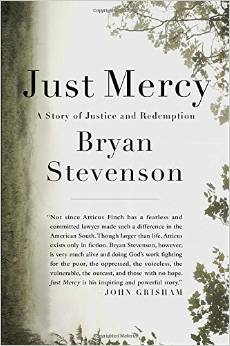 Just Mercy: A story of Justice and Redemption by Bryan Stevenson, Spiegel & Grau, 2014.
Just Mercy: A story of Justice and Redemption by Bryan Stevenson, Spiegel & Grau, 2014.
Gideon picked this week’s book. We had both heard the author interviewed on NPR and thought he sounded fascinating, so I got his book. When this guy had the time to write it I do not know. He got involved in death penalty cases while he was still in law school, and this passion took over his life. You can listen to the NPR interview here and watch his TED talk here.
I found this to be a hard book to read because it’s so heartbreaking but also because there’s no resolution for most if not all of the crimes he discusses. The spine of the book concerns the case of Walter McMillian, a young black man who was tried and sentenced to death for the murder of a young woman and who always insisted that he was innocent.
But he wasn’t the only one to insist on this: dozens of people gave him an alibi for being across town at the time of the murder, and there was no physical evidence at all to connect him to the crime. Instead, as is so often the case, the only evidence was that of one lone witness who had every reason to lie. Be warned that Stevenson isn’t interested in just telling McMillian’s story but in drawing a bigger picture, so he chops up his story into segments, bringing you right up to the brink of a revelation about the case and then dropping it for awhile as he explores others. I must admit that I did some skipping, but I’m pretty sure I ended up reading everything.
Several ideas occurred to me as I thought about writing this review. First of all, many conservative Christians say that they are for the death penalty because it’s biblical. If you think that way, I would encourage you to read the very thoughtful article in WORLD Magazine by Marvin Olasky here. We often think of the Old Testament as having tons of people stoned to death, but in reality that simply could not have been true. There were extremely stringent requirements that had to be met in a capital case, even to the extent that a false accusation would bring down the punishment sought on the liar’s own head. No one could be executed on the basis of circumstantial evidence, nor on the basis of only one person’s testimony. As Olasky rightly points out, the American system of justice rarely meets those requirements. Exodus 23:6-7 specifically forbids the type of behavior that Stevenson documents: “Do not deny justice to poor people in their lawsuits. Have nothing to do with a false charge and do not put an innocent or honest person to death, for I will not acquit the guilty” (NIV).
Our system of justice does not require that the guilty person be charged in order for an innocent person to be set free. Every person wrongfully imprisoned represents a criminal who has escaped punishment. Sometimes there is never going to be earthly justice. As Stevenson says at the end of the book, “I . . . thought about the fact that no one was ever prosecuted for Rhonda Morrison’s murder after Walter’s release. I thought about the anguish that must still create for her parents” (314). Stevenson is not an idealist; he is a realist. He knows that he won’t be able to help most of the people who appeal to him, but he still believes in the concepts of justice, mercy and compassion. I must include another quotation from the last page of the book: “Walter genuinely forgave the people who unfairly accused him, the people who convicted him, and the people who had judged him unworthy of mercy. And in the end, it was just mercy toward others that allowed him to recover a life worth celebrating, a life that overcame death and condemnation until it was time to die on God’s schedule.”